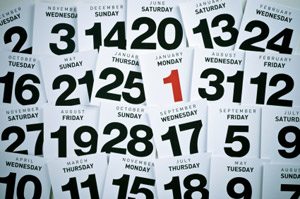This post is by Benny Hsu of Get Busy Living.
Have you ever tried to keep a new habit only for you to stop a week or a month later? It happens to all of us.
Don’t worry—you always get another chance to start again. The next time you want to start new habits in your life, try a different approach for success.
Here are some tips to help you to keep your new habits.
1. Know why you’re doing this
Having a strong reason why you are doing something is stronger than how you will do it. Knowing why will keep you focused when you’re tempted to quit. Let me give you an example.
If there is a board ten feet long on the floor and I tell you to walk on it, will you? Of course. If I put that board connecting the top of two buildings 40 stories up, will you cross it? Most likely not. Now if your child was on the other roof and it was on fire, would you walk across? You bet you would.
The situation stayed the same but your reason for going across was the motivator. It’s what drives you.
This is why many New Year’s resolutions fail so quickly. There’s not a meaningful reason for the change. It’s just something you feel like you should be doing.
Really know why you are making this habit and want to keep it. The ones who succeed in making new habits and keeping them are the ones that have a deep reason to change. Find yours.
2. Mark an X on your calendar
When working towards making positive changes, one way to keep you going is to chart your progress. Sometimes the physical progress is harder to see because the changes are gradual. You may need a way to visually see that you are making progress.
When I was training for my first half marathon, I printed out the training calendar and put an X after each day I trained. Once I started, it was rewarding to see so many Xs and to know how far I’d progressed. I wanted to keep those X’s going. I didn’t want a blank box.
At the end of a month, I couldn’t believe how many days of running I’d actually accomplished. Seeing it motivated me to keep the momentum going.
3. Don’t break the habit
Of course that seems obvious, but it’s more than that. You don’t want to do perform your habit for two weeks and then stop for two weeks and then decide to try again. Why?
When you consistently do something with regularity it keeps the momentum going. Doing it everyday keeps you in the routine. Once you stop for a period of time it’s harder to get that rhythm again.
Make an effort to stay consistent each day. Remember slow and steady wins the race.
4. Blog about it
Instead of being accountable to just one person, take it one step further if you have a blog and post your goals on there! You’ll get encouragement but also you’ll also have report to them.
Pat Flynn recently finished a 60 day workout program with amazing results. He said one of his biggest motivations was the people checking in on his progress. He didn’t want to let them down.
5. Don’t punish yourself for falling off the wagon for one day
Earlier, I said don’t break the habit. However we are are human and good habits are not easy to keep. If you skip a day or fall off the wagon, don’t think it’s the end of the world and you’re a failure.
Look at the big picture of how you’re doing. If you are doing something for a whole month like exercising or eating healthy and have one day where you feel lazy or eat a whole pizza, don’t be too hard on yourself.
If you’re trying to cut out soda but you had one at a friend’s house, it’s okay. One day won’t ruin everything.
Focus again starting tomorrow. You’re trying to incorporate this habit into a lifetime change so you’ll have plenty of time to stay on track.
6. Get money involved
Money is always a motivating factor for most people. Here’s one way to do it.
If you want to start a new habit of reading 30 pages of non-fiction a day, four days out of the week for a month, find a friend or relative you can trust and give that person $100 at the beginning of the month.
That person will give you $25 back every week you complete your goal of reading. If you fail to complete it, the person keeps $25. If you complete a week, you get $25 back. Keep going till the end of the month.
Don’t make the amount too extravagant, but don’t make it too small, either. If you do, you won’t care if you don’t have it. Also, make sure you’re honest with your results. Lying about it defeats the whole purpose.
7. Reward yourself
Set a time frame for rewarding yourself throughout the process, not just at the end. You should reward yourself because keeping a habit isn’t easy.
At the end of your set time, say a week or two, if you’ve been doing a great job sticking to your habit, reward yourself with something you want. A day at the spa. A trip to a baseball game. A shopping trip. It’s completely up to you.
Then at the end of a longer timeframe—say a month—give yourself a bigger reward, like a small vacation. If you’ve made it that far, you truly deserve it.
Keep that habit
Studies have shown that it takes three weeks to form a good habit. Take the list above and find the ones that will best motivate you to continue. Developing better habits will lead you to more success and happiness in your life.
Benny Hsu blogs at Get Busy Living where he’s inspiring others to live a remarkable life, explore ways to help people get unstuck and find what excites them everyday. You can also follow him Twitter @Benny_Hsu.








Recent Comments